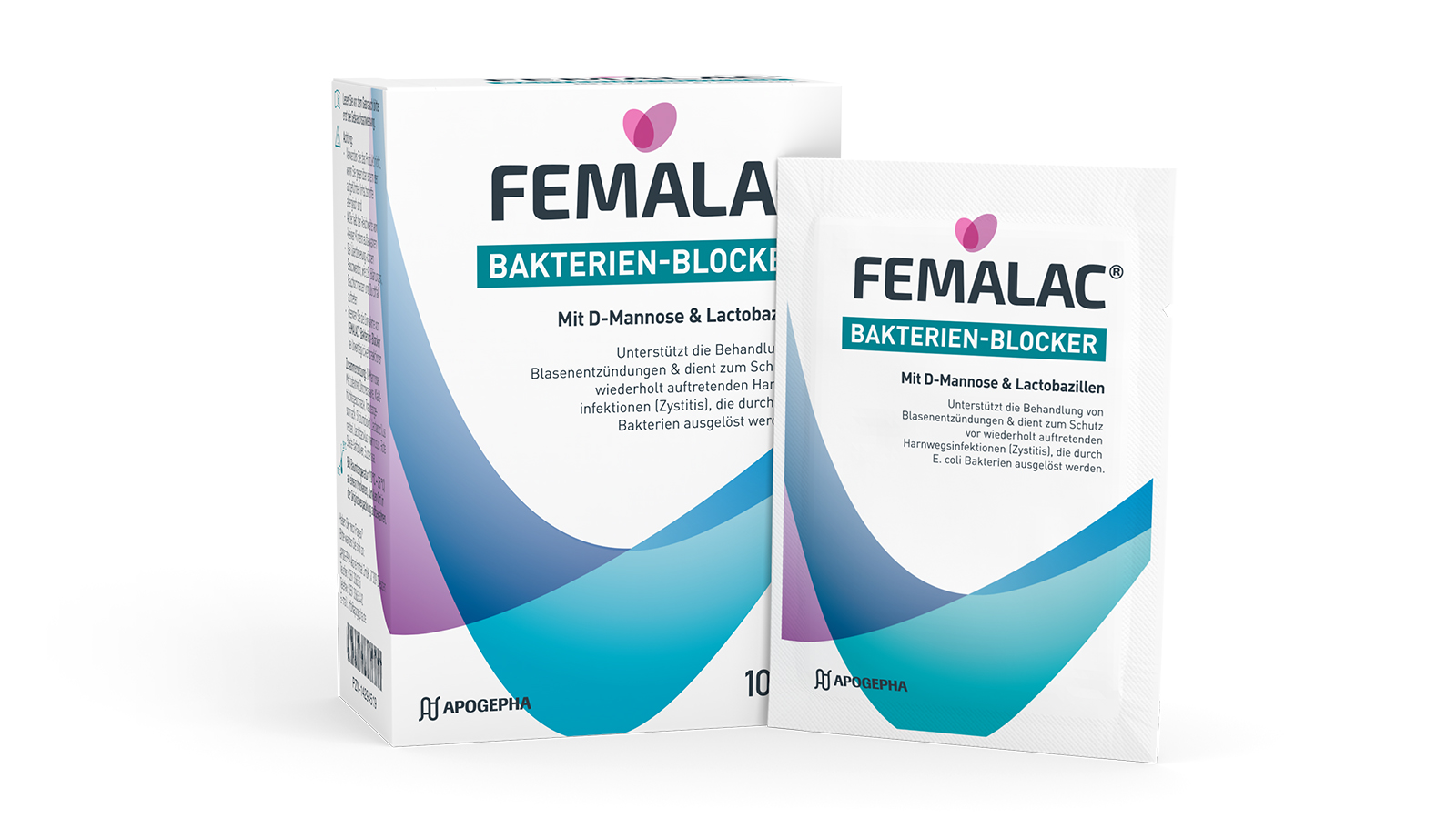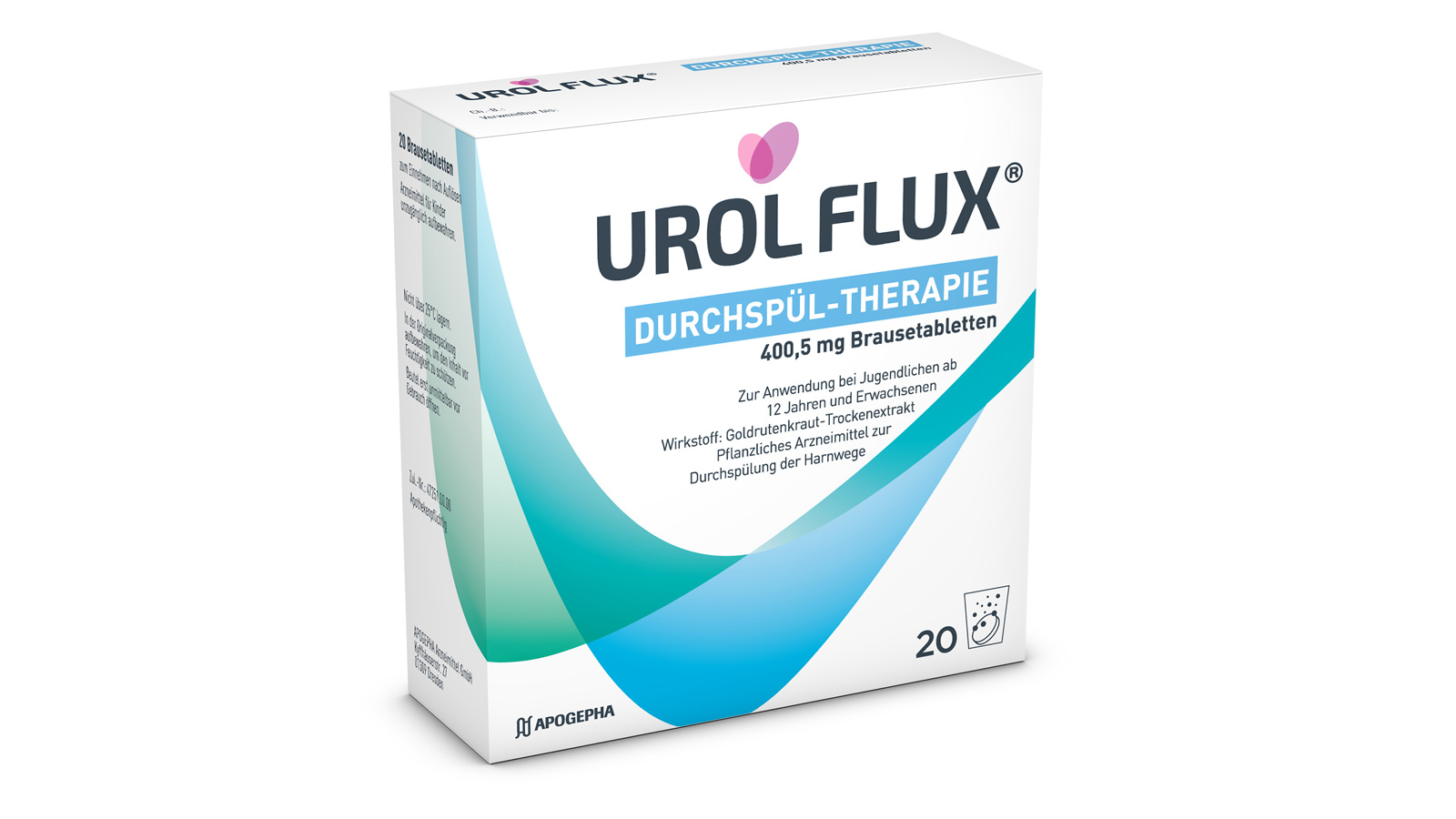Urinary tract infections - a common problem
Urinary tract infections are common and are accompanied by unpleasant symptoms, often by pain, and tend to occur repeatedly.

Symptoms of urinary tract infections
The symptoms of urinary tract infections are varied and can significantly impair the well-being and quality of life of those affected. Women are affected by urinary tract infections about four times more often than men.
The urinary tract – particularly susceptible to infections
Normally, the human urinary tract are free of bacteria. However, if bacteria settle there, they can cause urinary tract infections that easily spread throughout the urinary system. This means that a harmless bladder infection caused by hypothermia can develop into a dangerous pyelitis.
In general, doctors distinguish between uncomplicated and complicated urinary tract infections depending on localisation and/or severity. If urinary tract infections occur repeatedly at shorter intervals, they are called recurrent urinary tract infections. These are important distinctions for the purposes of treatment.
Diagnosis of urinary tract infections
Diagnosis is preceded by a doctor´s consultation, in which the symptoms are examined intensively. Based on this information and on a physical examination and urinalysis, your doctor can determine whether it is a urinary tract infection or some other condition, such as vaginitis or prostate inflammation.
Urine examination provides information about whether the urine contains white or red blood cells, protein or bacteria. Bacteria in the urine can also be analysed (pathogen detection) and tested in the laboratory (antibiogram) for their sensitivity to drugs (antibiotics). Certain blood tests provide information about the functioning of the kidneys.
In the case of severe symptoms, the doctor can also conduct an ultrasound examination to determine whether the urinary tract is blocked due to a urinary stone or other causes.
Treatment of urinary tract infections
The treatment of urinary tract infections depends on whether the infection is uncomplicated, complicated or recurrent.
Treatment of uncomplicated urinary tract infections
Uncomplicated urinary tract infections are not accompanied by any complicating factors such as problems during bladder emptying (e.g., caused by urinary stones or prostate enlargement) or diseases that weaken the body's defences. Uncomplicated urinary tract infections include infection of the bladder, also called cystitis. It is the most common infection of the urinary tract.
Bladder infections are particularly common in women because, unlike men, they have only a short urethra that opens out close to the vagina and anus. As a result, pathogens can penetrate into the bladder more easily.

Bladder infections are caused due to
- Hypothermia
- Stress
- Menstruation
- Vaginal rinsing and the use of chemical contraceptives
- Hormonal disorders during menopause and uterus prolapse
- Prostate enlargement.
Uncomplicated urinary tract infections generally have typical symptoms:
- Burning or pain during urination
- Frequent urination with low urine output
- Abdominal discomfort.
In addition to these classic symptoms, the urine is often cloudy, and sometimes contains visible impurities of blood and may have a foul odour.
In the case of an uncomplicated urinary tract infection, the renal pelvis can also be affected at times. In such cases, symptoms such as fever, pain in the kidney area and fatigue are common. In the event of such symptoms you should consult a doctor immediately so that the treatment can be adapted accordingly.
There are also asymptomatic bladder infections, whose only symptom is frequent urination, and are otherwise symptom-free. In such cases, there is a particular risk of “neglect”. If bladder infections are not cured successfully, they can develop into a chronic disease.
Treatment of complicated urinary tract infections
Complicated urinary tract infections include all those infections in which complicating factors such as obstruction of urine flow (e.g., due to urinary stones), weakening of immune defence, diabetes mellitus or other metabolic disorders are present. Complicated urinary tract infections usually also affect the renal pelvis and kidneys.
The initial symptoms of complicated urinary tract infections are similar to those of uncomplicated urinary tract infections, but are often more severe, can become worse and should always be taken seriously.
There are also other symptoms:
- Shivering
- Pain in the perineal and genital area
- Flank pain, flank swelling
- incontinence with frequent urination
- Visible blood in the urine
- urethrorrhea
- General feeling of illness as with a flu
- Nausea, vomiting.
Such serious urinary tract infections must be treated medically. If the condition is not treated properly or neglected, there is an increased risk of kidney damage with functional limitation or even kidney failure.
Treatment of recurrent urinary tract infections
About one fifth of the patients – predominantly women – experience relapses, the so-called recurrent urinary tract infections (urinary tract infections that occur repeatedly at frequent intervals).
In the case of recurrent urinary tract infections, there is a risk that the urinary system can be permanently damaged. For this reason, these infections must be treated.
Prevention of urinary tract infections
By following some simple rules, you can also make a decisive contribution towards preventing urinary tract infections:
- Drink about two litres of fluids per day (except in the case of heart or kidney diseases).
- Protect yourself from hypothermia. Remove wet clothing as soon as possible, change swimsuit immediately after swimming.
- Do not hold back the urge to urinate. Always go to the bathroom immediately. Urinating 6 to 8 times daily is normal.
- Do not squeeze your abdominal muscles while urinating, try to relax.
- Prevent constipation by eating plenty of fruit and vegetables.
- Clean the genital area after evacuating the bowels only from front to back.
- Women should go to the toilet to urinate no later than 15 minutes after sexual intercourse.
- Wear fresh, comfortable cotton underwear daily.
- Do not wash your genital area too often (once a day is enough) and only with skin-friendly liquid soap.
- Do not use any disinfectants or sprays in the genital area so as to protect the protective acid mantle of the skin.
- Change the flannel used for the genital area daily and reserve a special towel for this area. Never use common towels for this area.
- Avoid bubble baths or other bath additives as they can irritate the urethra.
- Men should clean the penis up to the furrow of the glans daily. Partners of patients with recurrent bladder infections or men with phimosis or frequent glans inflammation should immediately consult a urologist.
APOGEPHA products for urinary tract infections
Medicines that kill bacteria or prevent their multiplication are used in drug therapy for urinary tract infections. These medicines are called antibiotics.
Antibiotics for the treatment of urinary tract infections are available only on prescription. It is therefore essential to consult a doctor before starting this treatment.
Herbal remedies can be used to support an antibiotic therapy. These remedies flush the urinary tract by stimulating kidney activity, thereby preventing the settling of bacteria. The extract of the herb goldenrod, which we provide as Urol® flux in various dosage forms, are particularly suitable for this.

FEMALAC® Bacteria blocker
Supports the treatment of cystitis and shields against recurring urinary tract infections (cystitis) caused by E.coli bacteria
exclusive in pharmacies
-
contains gluten

UROL FLUX® RINSING THERAPY
Herbal medicinal product for flushing in the case of inflammatory diseases of the urinary tract, urinary stones and renal gravel, and for preventive treatment of urinary stones and renal gravel.
Goldenrod for drinking with multiple effects - also against irritable bladder.
Further information for you
Service material on urinary tract infections
Frequently asked questions about urinary tract infections
Health tips
Promoting overall health can also help treat urological disorders such as bladder weakness and improve overall wellbeing.


